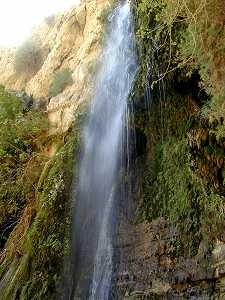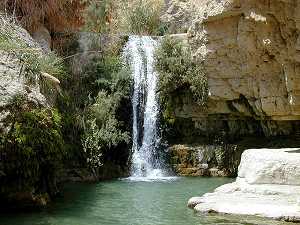Day 8
En Gedi
My lover is to me a cluster of henna blossoms from the vineyards of En Gedi. Song of Solomon 1:14
(click on the photo below for a LARGER view)

Barely one hundred feet from the desolate wilderness, the oasis of En Gedi supports lush green growth. Nearby, a spring of water runs from a rock, flowing down a cliff and creating the beautiful waterfall of En Gedi.
Surrounding En Gedi, the Judean Wilderness is a picture of dust and dryness. Caves are scattered amidst the rocks, and an occasional tree or bush struggles from the ground. About one mile away, the salty and still waters of the Dead Sea can be seen.
Looking at this panorama, one can hardly guess that a refreshing pool of water stands nearby. But in one of the wilderness’ many wadis, the oasis of En Gedi provides a cool refuge from the wilderness. It has sustained jungle-like greenery for thousands of years.
David and his men traveled through this area as they hid from Saul. No doubt they enjoyed a moment of rest at En Gedi, taking long drinks from the pure water. For centuries, men and women have soothed their thirst, watered their animals, and enjoyed the peace of En Gedi during their wilderness travels.
Living Water
En Gedi water represents the “living waters” mentioned frequently in the Text. For Hebrew culture, the refreshing and pure waters of En Gedi created a picture of God’s encouragement.
As they faced their battles in the Promised Land, God’s people grew weary of their mission to be a holy people at the crossroads of the world. In the midst of their troubles, many Israelites longed for the refreshment and strength of God.
One psalmist described his soul as thirsting for God “in a dry and weary land where there is no water” (Ps. 63:1). Another psalmist wrote, “As the deer pants for streams of water, so my soul pants for you, O God” (Ps. 42:1).
The Jews carried the concept of “living water” into their worship. Outside their temple and synagogues, they built mikvehs—ritual baths where they symbolically cleansed their hearts before worship. Recognizing their need for God’s cleansing, they used only “living water”—flowing from nearby springs or rain run-off—which was not touched by human hands.
Dead Water
Biblical writers made a distinction between living water and dead water. While living waters flowed constantly, offering clean and cool refreshment, cistern waters were “dead”—filled with muddy and stagnant water that had been poured by human hands.
The prophet Jeremiah warned God’s people about the foolishness of forsaking God’s living water. Through the prophet, God lamented about his people’s sin: “They have forsaken me, the spring of living water” (3:13).
What a vivid picture Jeremiah created with these words. By abandoning God, the Israelites ignored something as cool and refreshing as the En Gedi waterfall.
In their foolishness, the Israelites trusted in their own strength. Rejecting God’s refreshment, they turned to “dead” waters, trying to satisfy their thirst in pagan religions and their own selfish plans.
As Jeremiah pointed out, the Israelites were trying to quench their thirst in “broken cisterns.” Later, as they endured attacks and captivity, the Jewish people probably remembered Jeremiah’s words. Their false gods and human plans had turned out to be dead water indeed.
Jesus, too, spoke of living water. One day, as he talked with a Samaritan woman, he offered her living waters that would be even better than the springs and rivers of the land: Jesus’ water would become a spring inside of her, ending all of her thirst.

Like the Israelites, many times we find ourselves living in a wilderness. The culture around us does not embrace our values, and it can be tiring to live a life of service among people who don’t return our love.
As we try to impact our world, God often challenges us to face our fears and perform tasks that we feel incapable to perform. We may find ourselves enduring the dust of discouragement and the painful rocks of criticism and hatred.
As we face this wilderness, Christians can identify with the psalmist who thirsts for God. Sometimes we feel as though we just can’t continue. We have given of ourselves until there seems to be nothing left, and we feel empty and alone.
At times like these, God’s people need to go to En Gedi—a place where they renew their strength and enjoy God’s living water. Whether it be personal prayer, Bible study, worship with believers, or walks through creation, Jesus’ disciples must take time for activities that fill us up.
If we don’t drink God’s living water, we risk burnout. But when we do find our refreshment in God, we will find strength for the days ahead. “The water I give [you] will become in [you] a spring of water…” (John 4:13—14).
Prayer
Dear Heavenly Father. Help me accept the fact that only in you will I find true water that will refresh me. All other water will only leave me thirsty. Renew and refresh me. Amen
Did someone send you this Devotion? Would you like to receive future ones directly?
Click here to subscribe. While in the Middle East for a Biblical Study Journey with fellow Word Among Us Students, a 5-person crew is filming and taking pictures of the various sites. This vibrant photographic material will be incorporated into next year's Word Among Us classes.
Want to learn more about the Bible Jesus used – The Old Testament – and the Bible Jesus taught? Enroll today in Word Among Us – Cover to Cover study of the Bible starting in Genesis and going through Revelation including the inter - testamental period, using history and archeology and Biblical culture to make the text alive - taught by Tim Hetzner.
Class sites are across the USA. Click here for more information.
 Like the Israelites, many times we find ourselves living in a wilderness. The culture around us does not embrace our values, and it can be tiring to live a life of service among people who don’t return our love.
Like the Israelites, many times we find ourselves living in a wilderness. The culture around us does not embrace our values, and it can be tiring to live a life of service among people who don’t return our love.


0 Comments:
Post a Comment
<< Home